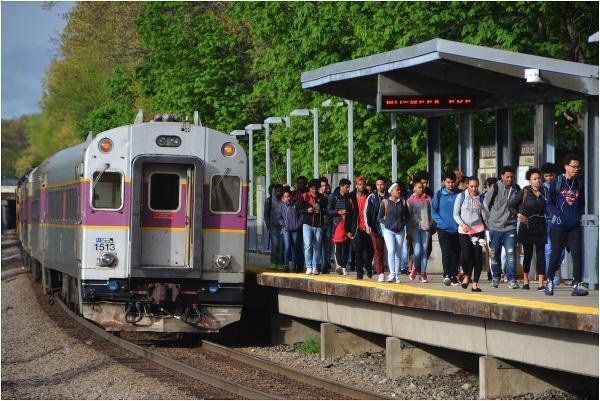September 18, 2017

Passengers are shown on the Fairmount Line's Morton Street station platform. Chris Lovett photo
The Fairmount Line is unique in the MBTA's commuter rail system, running almost entirely within Boston and serving a ridership that is primarily black and Latino.
Dorchester Rep. Evandro Carvalho wants the MBTA to experiment with changing service on the line into something more resembling rapid transit, running trains more frequently and allowing passengers to pay with Charlie Cards. And he wants a new law to do it.
Right now, service on the line runs about once an hour during peak periods, Carvalho told the Transportation Committee on Monday. His bill (H 2723) would direct the T to institute a pilot program running trains every 15 minutes during peak hours and every half hour during non-peak periods.
Fairmount Line trains are relatively empty compared to other lines. According to data the MBTA presented a year ago, the average weekday ridership of 1,038 on Fairmount is the lowest in the commuter rail system.
But taxpayers have already made substantial capital investments in the line, and supporters of Carvalho's bill contend that more frequent service options along the line would entice more people to use it more often.
"It's my own opinion that if they do this right, that particular corridor has the potential to match any other commuter line in terms of ridership," MBTA Advisory Board Executive Director Paul Regan told the committee. "The potential is there for that to be a very, very popular and successful service."
Over the past couple decades, the state and other funders have invested $200 million in Fairmount Line infrastructure, building new stations at Talbot Avenue, Four Corners/Geneva and Newmarket, and making upgrades to existing stations at Morton Street, Uphams Corner, Fairmount and Readville, according to an April 2017 study by The Boston Foundation. A station at Blue Hill Avenue is expected to open in two years.
More than 80 percent of Fairmount Corridor residents identify as a racial minority, and apart from the Mattapan trolley no other rapid transit lines serve areas where more than half of the residents are minorities, the study found. The corridor also has a higher proportion of low-income residents than any MBTA rapid transit line, according to the Boston Foundation.
Carvalho claims that "very modest improvements" caused a three-fold increase in ridership over about four years on the Fairmount Line. His bill would establish a two-year pilot where the T would devote three train sets to the line, synchronize bus schedules with the train, and allow people to use their Charlie Cards with free transfers to other transit options.
"This is the equity agenda that we always talk about and need to put into practice," said Allentza Michel, a transit activist.
Rep. William Straus, House chairman of the Transportation Committee, said Carvalho has been a persistent advocate for the pilot program.
"I just wanted to compliment the rep just so you know how many times he's blocked my passage through the chamber in order to talk about this bill," Straus said. "He is tireless."
Gov. Charlie Baker has emphasized improving the reliability of existing transit before expanding service.
Despite that guidance, the MBTA Fiscal and Management Control Board agreed this summer to pilot regular weekday commuter rail service to Foxborough starting in spring 2019. Boston transit activists expressed concerns that the new Foxborough service would diminish reliability along the Fairmount Line, which would be used to carry trains from Foxborough to South Station.
In May, Congressman Michael Capuano used campaign funds to pay for two weeks of free travel for users of the Fairmount Line and the T later found that by the second week ridership had increased 44 percent compared to the week before the program.
Newmarket Business Association Executive Director Susan Sullivan, who represents food companies and other businesses in the industrial area, said more frequent trips would enable more people from Boston neighborhoods to avail themselves of more than 28,000 jobs in Newmarket.
"We don't have enough people to fill those jobs on any given day," Sullivan said. She said, "It is a crime that these people in this corridor cannot get to these jobs without taking two buses and a subway."
Residents along the Fairmount Corridor have "some of the highest commute times and transportation costs," according to Boston Transportation Commissioner Gina Fiandaca, who said City Hall supports increasing the frequency of trains along the line.
Dorchester resident Rosalyn Johnson said the existing service is not sufficient.
"We do need rapid transportation in our community," Johnson told the committee. "And I just feel like we were promised service and we don't get it."
Topics:


